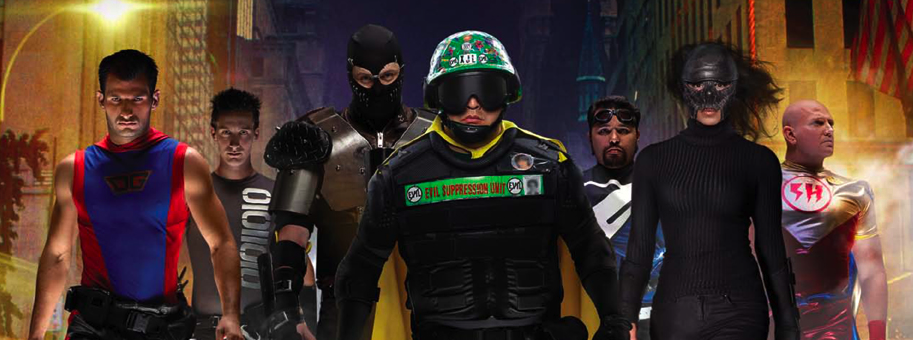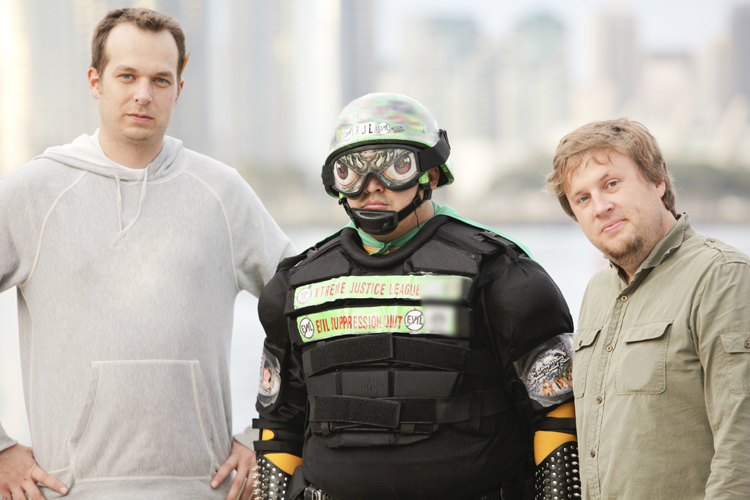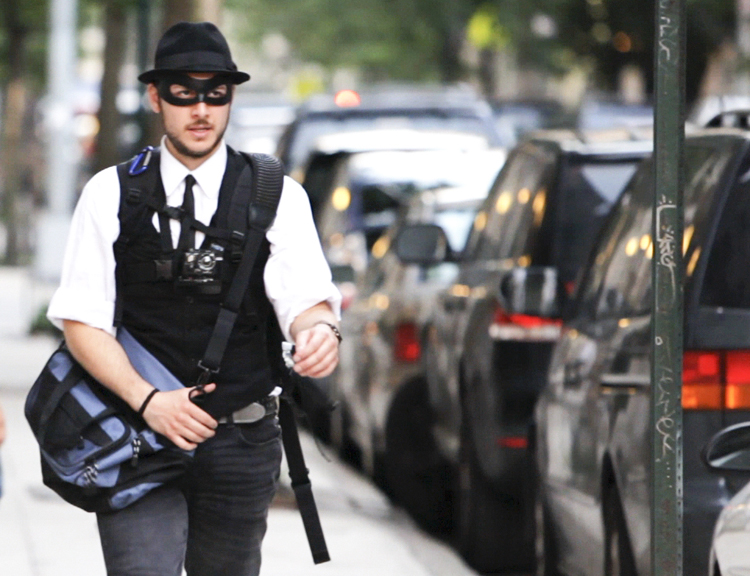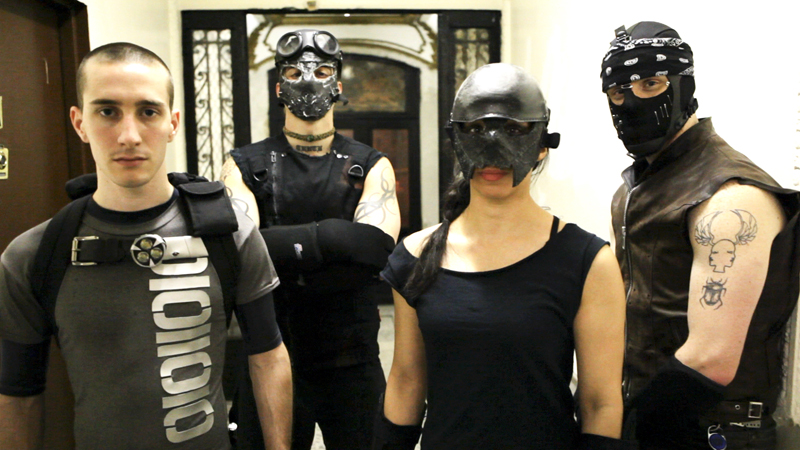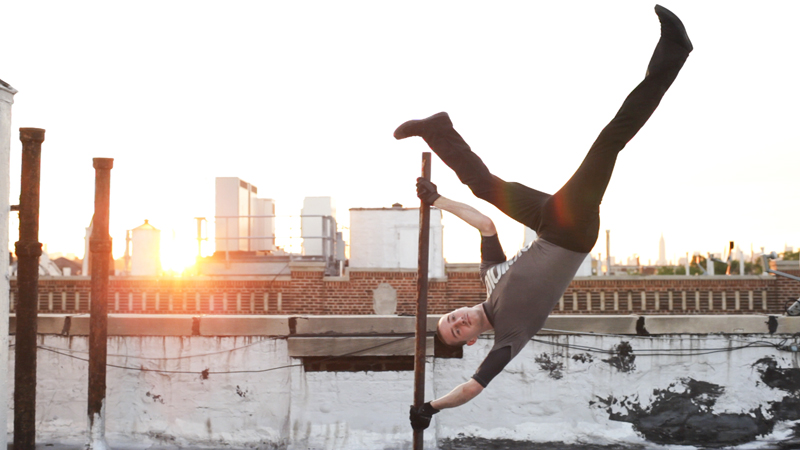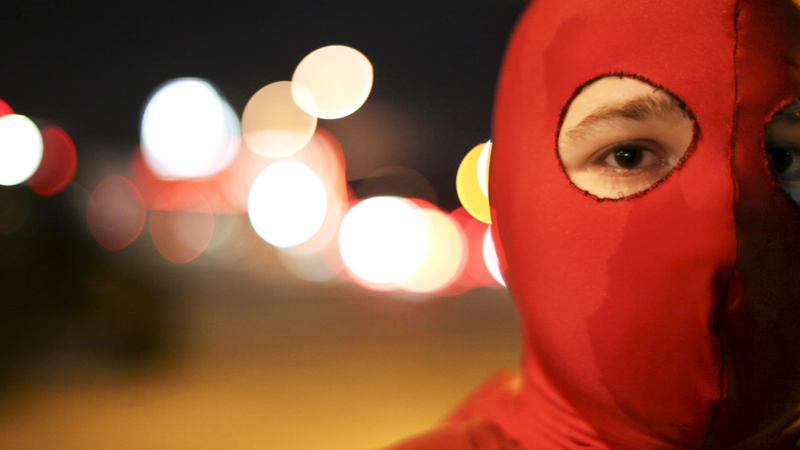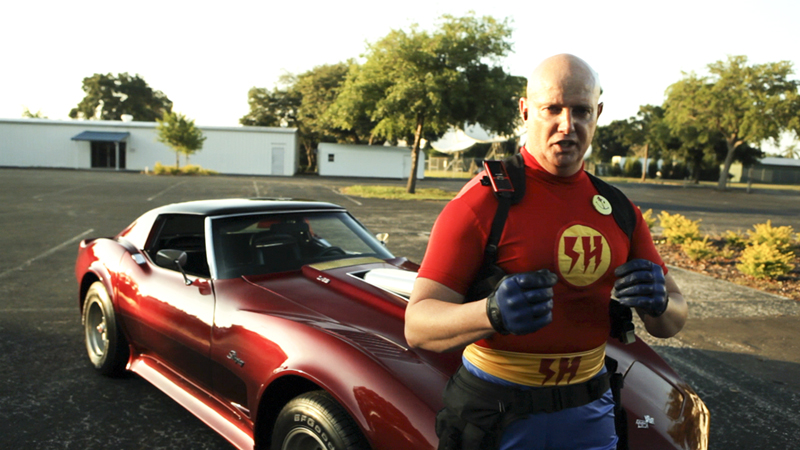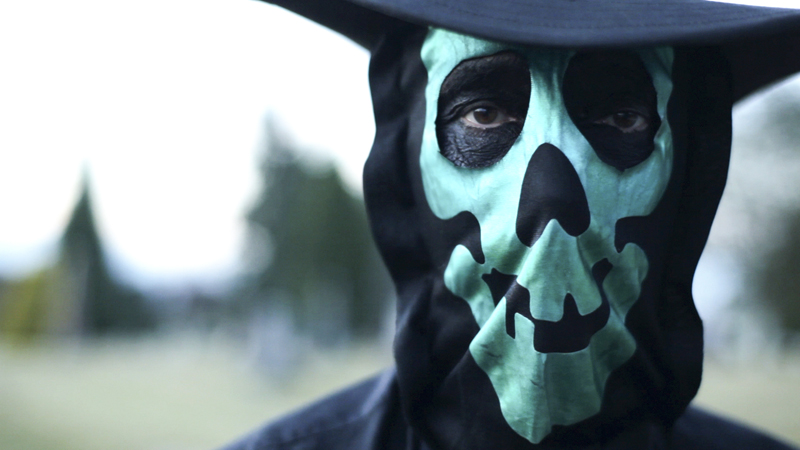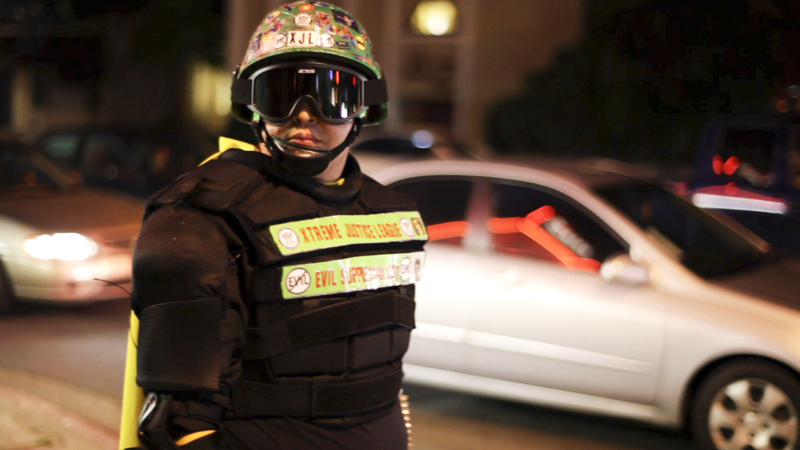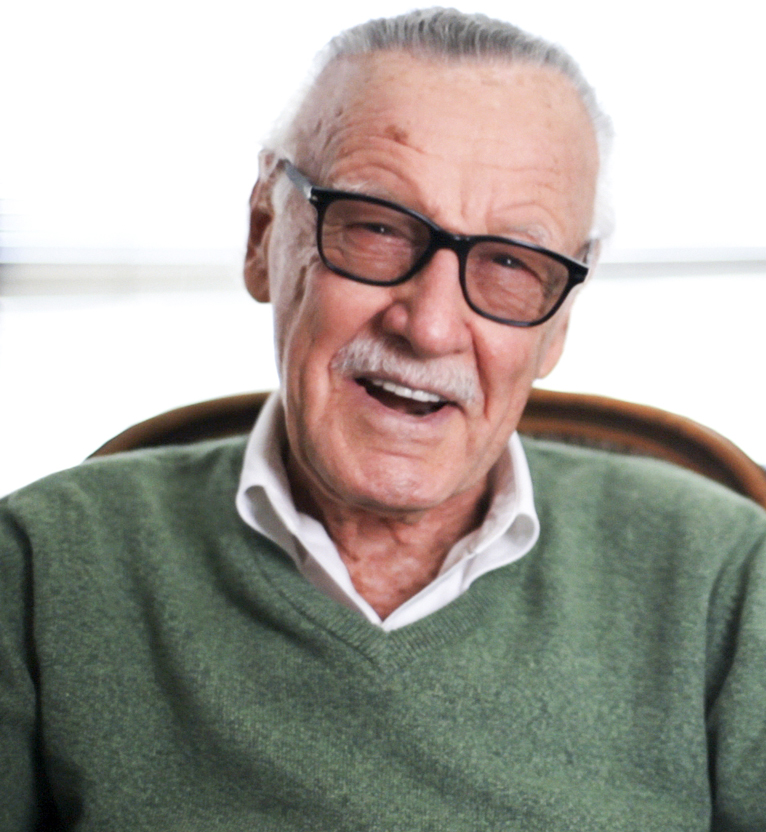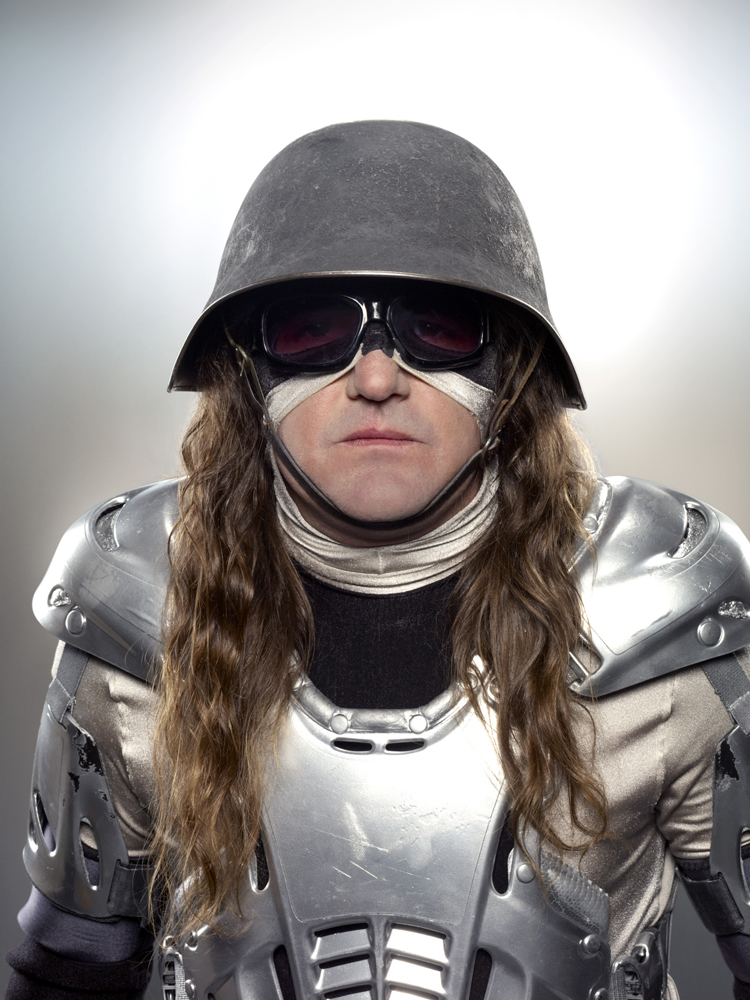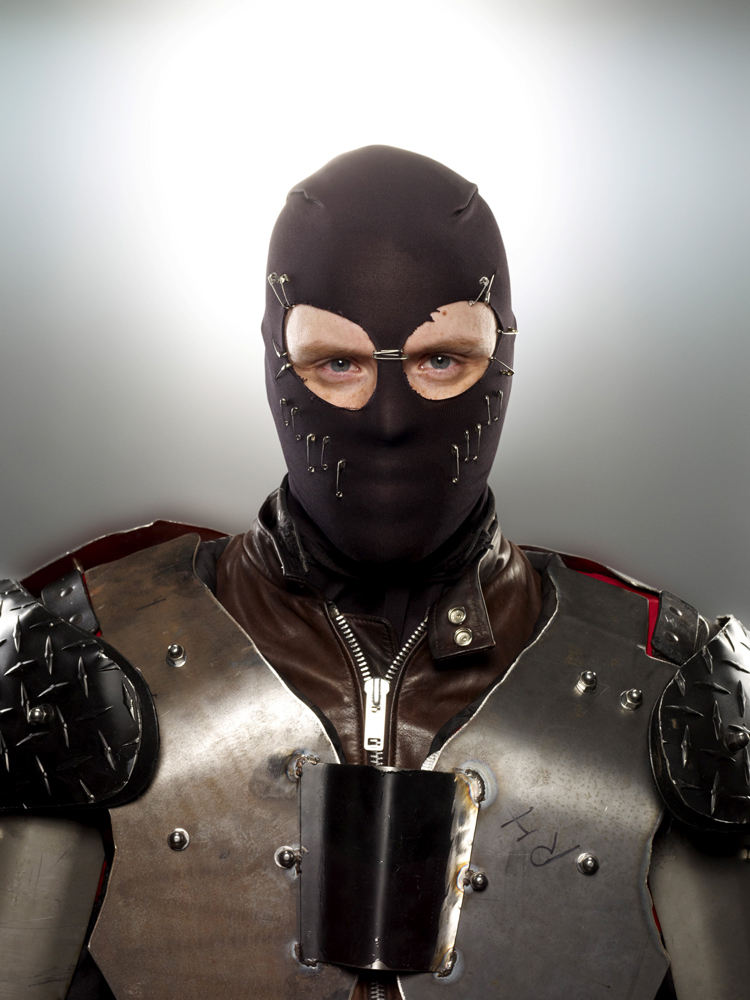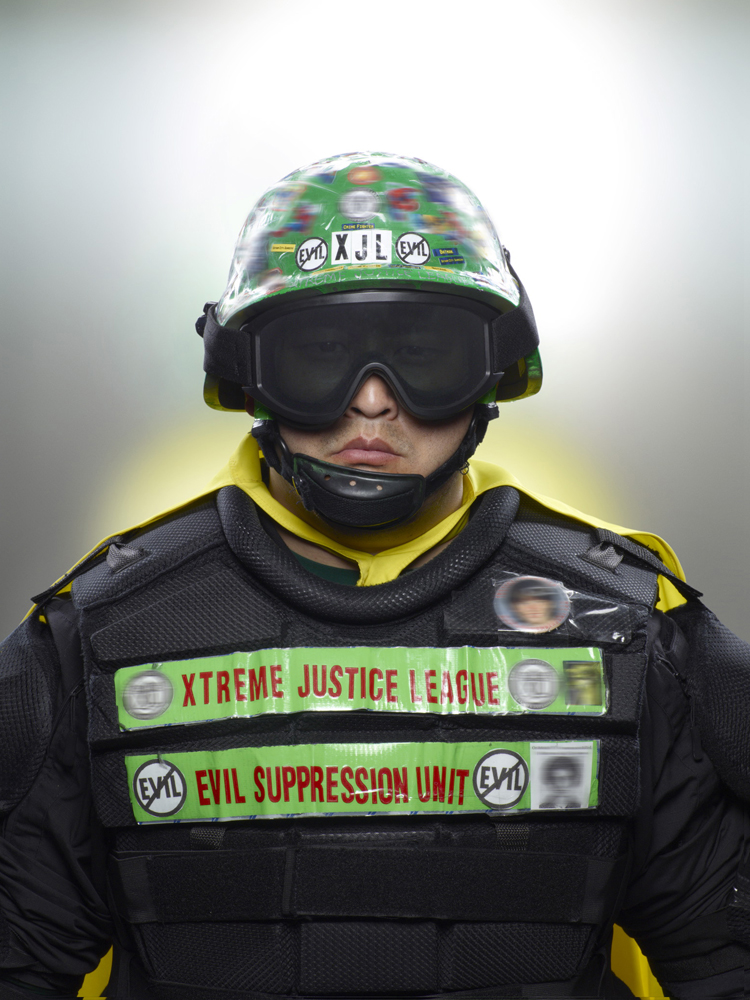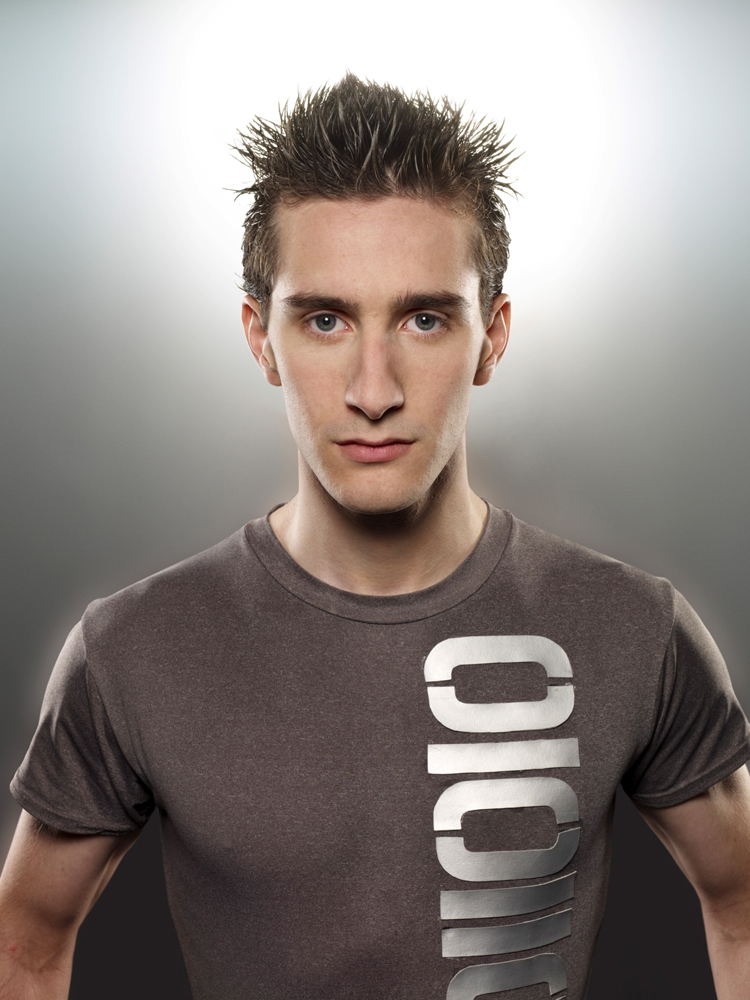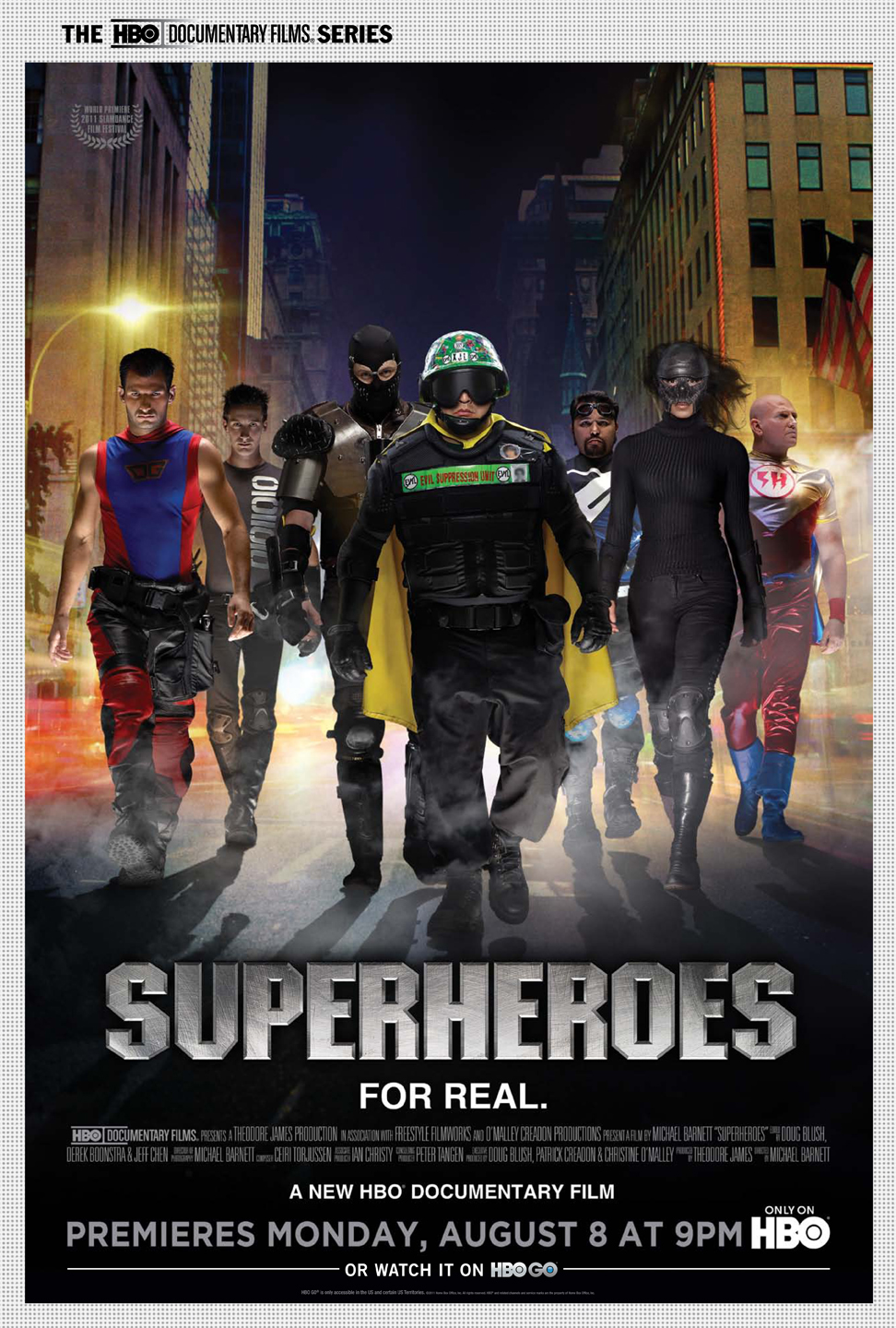Source: HBO | Posted By: Dan Geer
Anyone who has read comic books or loves superhero movies has thought about what it would be like to actually disguise oneself and take on a superhero persona to go out and fight crime. Most of us probably pretended to do so when we were kids (I, for one, always wanted to be Batman). Well, believe it or not, there are actually real-life “superheroes” out there who literally wear a mask or some sort of disguise to cover up their identities in order to perform heroic deeds (some actually don’t disguise themselves). Whether it’d be assisting in community service needs such as helping the homeless, or actually combating crime (either by alerting the proper authorities or fighting criminals on their own), these people actually exist.
While they aren’t exactly Batman or Spider-Man, and perhaps have delusions of grandeur, they have set out to help the world with the best intentions. HBO‘s newest documentary, appropriately titled Superheroes (premiering Monday, August 8th at 9PM), dives into the motivations of these people who feel compelled to take the law into their own hands. It features interviews with many of the so-called superheroes, as well as other commentators who give their take on the subject, including Marvel’s own Stan Lee. It really looks like it’ll be quite an amazing documentary to say the least. You can check out the official trailer, press release, photos, and an interview with Superheroes director Michael Barnett after the jump!
Official Superheroes Trailer:
Official Press Release:
For Immediate Release July 25, 2011
SUPERHEROES, EXPLORING THE WORLD OF REAL-LIFE
CAPED CRUSADERS OUT TO SAVE HUMANITY,
DEBUTS AUG. 8, EXCLUSIVELY ON HBOThey patrol the dark and dangerous streets, seeking out criminals and villains, veiled in secret identities. They call themselves real-life superheroes (RLSH), and they are out to save humanity.
From New York to San Diego, the exclusive HBO documentary SUPERHEROES profiles real-life caped crusaders who don masks, homemade costumes and elaborate utility belts to battle evildoers everywhere when it debuts MONDAY, AUG. 8 (9:00-10:30 p.m. ET/PT), exclusively on HBO.
Other HBO playdates: Aug. 8 (5:25 a.m.), 11 (11:30 a.m.), 13 (1:30 p.m.), 16 (10:00 a.m., 12:30 a.m.) and 21 (4:45 p.m.)
HBO2 playdates: Aug. 10 (8:00 p.m.) and 27 (4:30 p.m.)
HBO Documentary Films presents another weekly series this summer, debuting a provocative new special every Monday through Aug. 15. Other August films include: “Koran by Heart” (Aug. 1) and “Gloria: In Her Own Words” (Aug. 15).
There are currently more than 300 registered superheroes in the United States. Through candid interviews, patrol footage, archival material and motion graphics, SUPERHEROES explores this cultural phenomenon, revealing what inspires these everyday citizens to take the law into their own hands as they try to make the world a better place.
The film spotlights several of the countryʼs most famous masked heroes, including San Diegoʼs Mr. Xtreme and the members of Brooklynʼs New York Initiative (N.Y.I.) as they guard city streets with the goal of deterring violent crimes. SUPERHEROES also features interviews with: Stan Lee, legendary comic-book writer and former Marvel Comics chairman, who co-created Spider-Man, The Fantastic Four, The X-Men, Hulk and Iron Man; Lt. Andrea Brown, a 24-year veteran of the San Diego Police Department; and Robin Rosenberg, a clinical psychologist and expert on the psychology of superheroes, both real-life and fictional.
Whether they actually protect the public from crime or are just oddball vigilantes, the vast majority of these men and women are motivated by a heartfelt desire to fight apathy and the so-called “bystander effect.” Some of the superheroes profiled in the film were inspired by the widely reported 1964 murder of Kitty Genovese, in which neighbors heard the victimʼs screams without coming to her aid. Others decided to turn their lives around after struggling with violence, depression or addiction. Many RLSH channel their energies into doing a variety of good deeds, from giving out food and water to the homeless, to organizing toy drives for children in shelters. Among the RLSH spotlighted are:
Mr. Xtreme, a 33-year old man of conviction and purpose, with a loathing for apathy and indifference. He sets out on nightly patrols in his hometown of San Diego to deter violent crime before it occurs. An imposing figure of neon and camouflage, Mr. Xtreme will stop at nothing to protect his community from the villains and goons who reap fear throughout greater San Diego.
Zimmer (N.Y.I.), the only unmasked superhero in the documentary. A twentysomething gay man, he feels he needs to be as open about his RLSH identity as he is about his sexuality. Zimmerʼs no-frills uniform consists of black pants and a basic grey tee.
Lucid (N.Y.I.), who settled in Brooklyn to lend a helping hand to the N.Y.I. and assist in “bait” patrols. Big, strong and nomadic at heart, he wears the pain, joy and experience of his life as tattoos, and can be heard saying, “Iʼve hurt enough people in my life, now itʼs time to give back.”
T.S.A.F. (N.Y.I.), pronounced “Saf,” which stands for “The Silenced and Forgotten.” Enigmatic, beautiful and fierce, T.S.A.F. brings an unparalleled passion to her work in the N.Y.I. as she puts herself in harmʼs way.
Master Legend, whose outsized personality and over-the-top energy are exceeded only by the sincerity of his convictions and the enormity of his heart, which he puts to near-constant use in his community of Orlando, Fla.
Dark Guardian, who stands alone as a beacon of light in the shadow world of street drug peddlers. Seemingly unafraid, he heads out to parks where drugs are being sold in plain sight of children, and does everything in his power to drive dealers away.
Life, who selflessly works on behalf of Manhattanʼs homeless population, delivering the smaller necessities of a life lived on the urban streets while minimally costumed in a mask and tie-and-jacket.
In addition to its premiere at the 2011 Slamdance Film Festival, SUPERHEROES screened July 23 at this yearʼs Comic-Con International in San Diego. SUPERHEROES is directed by Michael Barnett; produced by Theodore James in association with Freestyle Filmworks and OʼMalley Creadon Productions; co-written by Michael Barnett and Theodore James; executive produced by Doug Blush, Patrick Creadon and Christine OʼMalley; edited by Doug Blush, Derek Boonstra and Jeff Chen.
Interview with Superheroes director Michael Barnett:
Q: Question
MB: Michael BarnettQ: You’ve been in the film business a long time, so what got you on the path to making documentaries?
MB: Yeah I’d been a director of photography for a long time so I really started my career in the film business from the camera side, and shot a lot of verite. I’d worked on a lot of films and I noticed when I started working on indie films I tended to always chose handheld and go very naturalistic and I think that became my voice and I really evolved as a camera person and a story teller through verite. And then when I felt that I was ready, I would say probably two or three years ago, I saw that you know I’d been shooting for about 15 years and I thought that I was really ready to tell my own story and helm the ship, if you will. I was shooting a film for a friend about SpongeBob for Nickelodeon and that producer asked me if I had any ideas and I’d kind of stashed away this real life superhero community idea. I’d been doing a little research on it and there were so many articles and local news stories online and I’d just kind of been gathering and the perfect storm happened when I found a producer who was really interested in doing the project. And we started doing some research and we were perpetually fascinated by what we were finding, and yeah, we just kind of jumped in and did it and self financed it and I thought that I couldn’t have chosen a better topic for my first film.
Q: This is definitely a topic that resonates with a lot of people and I think one of the first questions that you have when you see, even just a trailer, is where did you find these people?
MB: Yeah really we discovered they’re ubiquitous. I mean – they’re everywhere. They’re in every major city in America. So once we started doing our research the biggest hurdle was narrowing down who we thought could be a compelling story for the film, and there were hundreds that we first interviewed. So ultimately we, after doing some research, discovered who the pillars of the community were and who were [the ones] out there doing the good work and Mr. Xtreme had been doing it for a long, long time and Zetaman, and Life, and Dark Guardian, and Master Legend and we decided to focus on, for the most part, the veterans.
Q: What were some of your favorite superheroes that didn’t make it into the final cut?
MB: Yeah we spent a lot of time with Zetaman and his story is really boiled down. We had to make some really tough choices editorially about who we were going to focus on and we didn’t want just a huge tapestry we really wanted to focus on a couple of characters and in particular one, Mr. Xtreme, to really tell this macro story about the state of America and the evolution of pop culture. And we wanted to try and really narrow that down and tell it through one main story but we had to use everybody to do that. But Zetaman was a guy who we spent a lot of time with, and he’s a very noble guy, and sadly his story was really diminished in the final film. Black Monday Society was another great group of guys in Salt Lake City that we spent a lot of time with and we just sadly had to tear it down. Had to really boil it down to the essence of Mr. Xtreme, and the NYI (New York Initiative), and Master Legend were the choices that we ended up going with. So that’s the lovely thing about online and DVD we get to cut up these stories and release it to people. They’ll get to experience the greatness of some of these characters that we just didn’t get to really flesh out in the film.
Q: Interviewing all these different people did you ever notice any sort of patterns in their psychology? A couple of them mention in the film having histories of violence in their family, did you ever notice a certain type of “profile”, if you will, of the kind of person that dresses up as a superhero?
MB: Yeah it’s very tough to make generalizations about the community because it’s so vast and I tend to not, but if I were to make one generalization, well I’m probably making a bunch here but, if I were to make one it’s that by and large these guys do this [because] it manifests itself out of some level of tragedy or trauma that’s existed in their lives and they kind of found a way to rise above that, and use that darkness to do good. And it’s fascinating to think that every one of these guys does that and it’s not every one of them – there are a few of them like Life that had a great upbringing and you know he just does this. He’s an orthodox Jew who believes that he just needs to make the world better. And I think he had a great family but he’s really a minority I mean most of the people in the film really they really came from a very traumatic place in their past, and a dark place typically.
Q: Did you have any preconceived notions going into the film that were torn down?
MB: Yeah I thought we were going to find something that was going to be eccentric. But ultimately I probably had, looking back, a very two-dimensional vision of what this community is. I thought I was going to make a film that was going to be about the evolution of pop culture mythology, about what it meant for the evolution of the superhero mythology coming from the page to the screen and ultimately evolving into real life and coming off the screen and off the pages. We did find that and we also found a lot more. We found some stuff that’s quite profound even.
Q: Yeah, definitely.
MB: The film really did become a commentary about the state of America and where we are and what is America’s bureaucratic ability to help and how people sort of embrace or completely abandon help, bureaucratic help, and these guys pretty much abandon it. They believe that help is not coming effectively from the top so they’re going to do what they can to create help from the bottom.
Q: You also interviewed the police, did you notice any norms as far as how much they’re willing to work with these people or how much involvement they typically have with the police?
MB: We spoke with a lot of police. The relationship between the real life superhero community and every police department is complex, to say the least. It’s really complex and it’s regional. Most of the police departments did not want to go on record. New York police would not go on record, Portland police would not go on record, Seattle police would not go on record – we kept trying but we did speak with them at length. Ultimately I think the police in San Diego are fascinating. Mr. Xtreme is becoming a real personality down there and his notoriety is growing daily and they’ve chosen to embrace him. And we were lucky to shoot that relationship kind of evolving; I mean by the end of the film he’d gained some notoriety from the deputy mayor’s department. And the police are very aware when he’s out patrolling now and he has a big team now. I mean he goes out with 8 or 9 or 10 people. So that’s an interesting evolution of that relationship, but by and large I think the police are weary of what these guys do. I think they are concerned that these guys are going to maybe exacerbate an already dangerous situation without the proper training – tactical training. So yeah it’s a complex relationship and one that I think is going to continue evolving regionally. I think inevitably one of these guys is probably going to get hurt in a tragic situation and that’ll probably create a new set of rules for that area and what it means to go out and do this. But as of right now it’s a bit of the Wild West for the real life superhero community. I mean they’re all out running around and a lot of them are quite heavily armed, and a lot of them aren’t trained – some of them are trained – but there’s no rulebook. You don’t have to pass an exam to become a real life superhero, you just have to develop your own original persona and put on a costume and go out in your community and do good.
Q: Have there been a lot of documented cases of these superheroes bringing in criminals like the serial groper that you feature in the film?
MB: There hasn’t been. Crime is pretty elusive. For the most part these guys are really discovering what it means to go out and fight crime. I think police for the most part deter a crime with their presence. And they try to solve crime after it happens, but very rarely are they there for crime. And these guys, the real life superhero community, are quickly discovering that crime is an elusive thing and that their presence does deter crime and that’s a great thing. And when they are there and something happens, which is pretty rare, to witness crime you know, criminals are pretty shifty. But one of these real life superheroes will be, depending on how you want to look at it, at the right place and the right time or the wrong place at the wrong time and I think it’s going to have tragic consequences you know? I really appreciate that they’re out there and being a deterrent I think that’s an effective thing. Having an extra set of eyes and ears on the streets is a good thing and that’s why I really love Mr. Xtreme – he understands the rules. He knows that he’s not there to infringe upon people’s civil rights; he’s there just to be a deterrent. He doesn’t ever want anything to happen. There [are] very complex relationships and possibilities of what could happen. I mean we shall see if this community grows and evolves.
Q: Did you ever observe any sort of internal struggle within the superhero community?
MB: I think the definition of being a real life super hero comes with a massive amount of internal struggle about what it means to do good, and where that line is. And your job is basically judging whether other people are good or bad, so yeah, I think the definition of their job comes with a lot of internal struggle. And there’s a lot of struggle within the community as well about what it means to be a real life superhero. There’s a real definitive line in the sand, you know one camp believes that doing homeless outreach is the only way to be heroic and you should leave crime fighting to the trained police, and the other camp thinks that you should fight crime – a real hero puts themselves in harm’s way – and you should leave homeless outreach to salvation army and missions. So I think there’s a lot of struggle. I think they’re all defining what it means to be a real life superhero as a community, and they’re defining what it means to be a real life superhero internally. And they’re all really discovering who and what they are individually as humans.
Photos (Click for large versions):
Theodore James, Mr. Extreme & Michael Barnett
Life
Zimmer, Z, TSAF & Lucid
Zimmer
The Vigilante Spider
Dark Guardian
Super Hero
Thanatos
Mr. Xtreme
Stan Lee
Master Legend
Z
Mr. Xtreme
Zimmer
